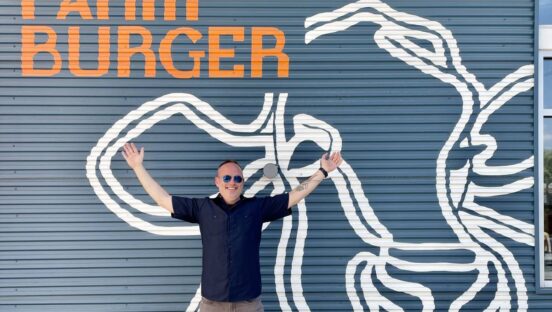For as popular as the “farm to table” moniker has become, few restaurateurs can claim to have followed that path first-hand. But Jason Mann is a different story. For years, he worked in sustainable agriculture and even raised his own herd of grass-fed cattle before the restaurant world came knocking.
Over a decade ago, Mann, along with some business partners, opened full-service Farm 255 in Athens, Georgia. The sustainable restaurant focused on building relationships with farmers and suppliers—but that wasn’t enough. Mann wanted to continue spreading “the gospel of grass-fed,” so he and restaurateur George Frangos launched Farm Burger in 2010 with the goal of turning out upscale burgers in a fast-casual environment.
“We wanted to democratize the grass-fed burger,” Mann says. “No one was taking this restaurant-quality—let’s call it $12–$20 burger experience—and putting it into a price point that would make it accessible to a broader demographic.”
Supply is critical to the brand, and it works with farmers and producers on nearly every aspect of the menu, whether it’s the beef, local heirloom tomatoes, or goat cheese.
“You’re getting a premium product, and such a level of care has gone into the sourcing, whether it’s lettuce or the meat or the bun,” Mann says. “If you start to ask questions and care about who produced this cattle, who grew those onions or lettuce, that’s awesome, and our staff is there and they’re super informed. Everyone who works for us has to visit the farms. We are very transparent, and we want people to understand where our product comes from.”
The restaurant uses a whole-animal blend in creating its patties, grounding the meat in-house from cuts like filet, rib, loin, chuck, and the saddle—a combination that Mann says creates a uniform, fatty burger.
Guests can build their own burgers (starting at $6.95) with an abundance of free toppings, including fresh jalapeños and roasted garlic. They can also add premium toppers such as a $1 fried farm egg, $2 Gruyère, or $3 roasted bone marrow.
The concept also offers set combos through “Blackboard Burgers,” which typically fall in the $8–$10 range. Despite the name, Farm Burger isn’t just about burgers; it also serves specialty snacks like boiled peanuts and fried chicken livers; vegan, chicken, and pork burgers; and ever-changing salads and soups with seasonal ingredients.
“If you want to eat local, organic food for under $12, you can get a huge salad, a veggie patty, and whatever the special side is,” Mann says. “You could have a Sweetgreen experience at Farm Burger if you’re in the know.”
Farm Burger
FOUNDERS: Jason Mann & George Frangos
HEADQUARTERS: Decatur, Georgia
YEAR STARTED: 2010
ANNUAL SALES: Undisclosed
TOTAL UNITS: 9
FRANCHISE UNITS: 0
Still, there have been some tradeoffs in the business, Mann says. The team has learned that people don’t always want local or seasonal products; sometimes they want Heinz ketchup and a Coca-Cola. “We tried to create our own ketchup in the beginning, and then get some fancy artisan ketchup, but now we use organic Heinz. That’s what people want,” he says.
From its start in the Decatur neighborhood of Atlanta, Farm Burger has focused on Southeast expansion, with locations in Asheville, North Carolina; Huntsville, Alabama; and Nashville, Tennessee, though it also has two California outposts.
“When I think about our sites, it’s that qualitative, quantitative dance. We know to a certain degree our core demographic profile,” Mann says. “They’re people that care about their families, that care about what they put in their refrigerator, that are willing to think critically about how they spend their food dollars and make their food choices.”
Along those same lines, Farm Burger looks for communities in which it can become part of the social and economic fabric. Whether it’s sponsoring a local baseball team or participating in local farming events, the brand strives to establish itself as the local neighborhood burger joint.
Farm Burger is conservative with its growth, as its approach to sourcing—both in food and design—requires communities to support it. “Supply is critical to us; if anything is going to limit or define us in growth long-term, it’s that core value of our commitment to our farmers, to our guests, and to our chefs and our employees,” Mann says.The brand tries to invest in local reclaimed wood for its stores, while also hiring local artisans to make the furniture and décor.
Mann says Farm Burger plans to open about four to six units per year over the next five years in markets throughout North Carolina, South Carolina, and Georgia.
Above all, the brand hopes to tailor the experience to all of its diners, whether they’re craving a basic burger with iceberg lettuce, tomato, and red onion, or wanting to load it up with toppings and build a $15 burger.
“I wanted my grandma to be able to go in there and have the burger that she ate 25 years ago, and at the same time, I wanted my hipster friends to go in there and put on roasted bone marrow and oxtail marmalade and totally geek out,” Mann says. “I want those two experiences to happen side by side, and [guests] don’t even know.”








